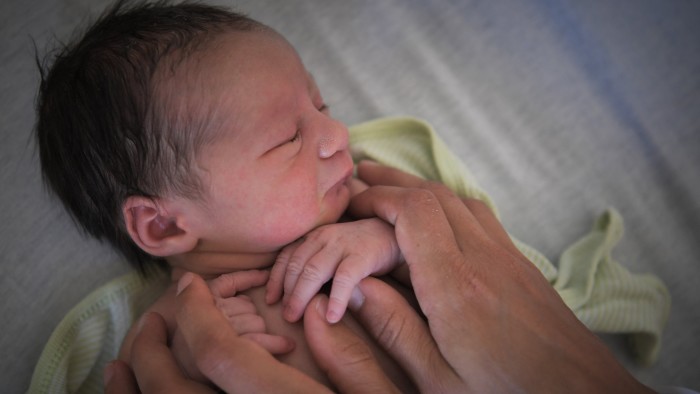Unlock the Editor’s Digest for free
Roula Khalaf, Editor of the FT, selects her favourite stories in this weekly newsletter.
The number of babies born in the EU hit a record low last year, according to official data that highlights the severity of the region’s demographic challenges.
Births across the 27 member states in the bloc fell to 3,665,000 in 2023, according to figures updated last month, the lowest since comparable data was first collected in 1961.
The figure also represented a 5.5 per cent fall from 2022’s total of births — the largest annual decline on record.
The data was compiled from the latest member state figures by Eurostat, the EU’s statistical office, and was contained in a periodic update of its spreadsheet.
The 2023 figure is lower than the 4mn EU births forecast last year in Eurostat’s long-term population projections.
Since reaching a peak of nearly 7mn births in the mid-1960s, birth rates in the nations that now make up the EU have declined sharply and are around the same level as in the US.
Europe’s dearth of children is expected to heap pressure on state finances, as working-age populations shrink and the cost of spending in areas such as healthcare and pensions rises.
Demographic experts believe the long-standing trend of Europeans having fewer and fewer babies may have been exacerbated by concerns over climate change, the pandemic and the worst surge in inflation in a generation.
“It is possible that the perceived uncertainties — such as . . . job insecurity, rising costs of living and housing prices, and multiple global crises, including the Covid-19 pandemic, geopolitical tensions and climate change — could negatively affect individual reproductive decisions,” said Guangyu Zhang, population affairs officer at the UN.
“Youngsters have greater difficulty than before to establish themselves in the labour market, in the housing market, and perhaps also in the dating market,” said Willem Adema, senior economist at the OECD. “That is one part of the story which is fairly clear.”
Maria Rita Testa, a professor of demography at Luiss University in Rome, said that while many factors affected the decision to have children, there were new reasons related to political and economic “tensions at the international level”, as well as “concerns over climate change”.
As people delay parenthood, women in the region are giving birth at a later age.
Eurostat figures published earlier this year showed the average age of women at the birth of their first child was rising, and was nearly 30 in 2022, up from 28.8 in 2013.
The share of births among mothers aged 40 and above has more than doubled over the past decade rising from 2.5 per cent to 6 per cent, reflecting a delay in parenthood, with many women choosing to have children closer to the upper limit of the reproductive age range, which the UN defines as ending at 49 years old.
The trend in people having fewer children is seen most sharply in Italy, Spain, Greece, Poland, Finland and the Baltic states — where births have fallen by at least a quarter over the past decade.
Adema said governments should prepare for a future of low fertility and consider steps to boost immigration, productivity and levels of labour force participation, particularly among women.
Testa urged governments to support young people, calling for an “approach where young men and women are helped in several life domains: in education, in the labour market, in mental health and in accessing affordable housing”.
Data visualisation by Will Crofton in London
Read the full article here




